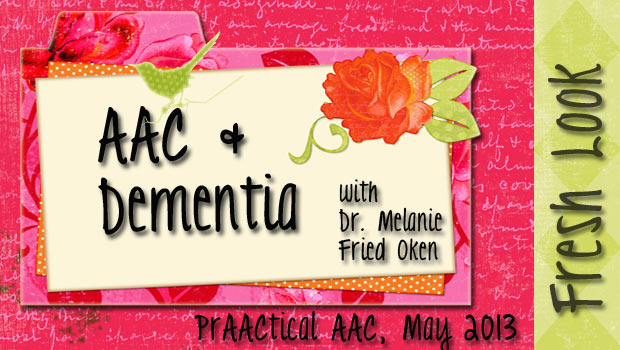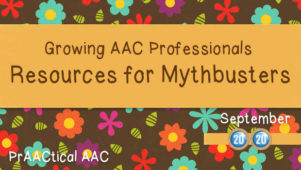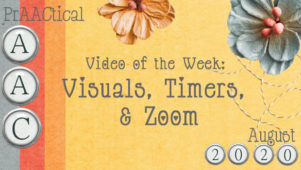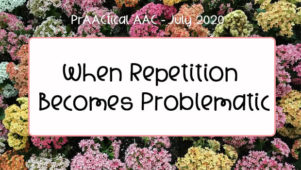Fresh Look at AAC and Dementia with Melanie Fried Oken

We’re thrilled to continue our Fresh Look series in celebration of Better Hearing and Speech Month (#BHSM). In this post, Dr. Melanie Fried Oken, from the Oregon Health and Science University, talks about some AAC strategies for people with dementia. I was captivated by her 2012 presentation on this topic at ISAAC 2012, and knew it was important to be able to share some of you work with you. We have much to offer these individuals with dementia, and Melanie’s post and linked resources are a great way to get started.
:::::::::::::::::::::::::::::::::::::::::::::::::
Hey, what about us AAC providers who work with adults? We love reading PrAACtical AAC and can often adjust the tips, equipment recommendations, and strategies to meet our population needs. So when Carole gave me an opportunity to blog  about AAC for adults with dementia, I grabbed the chance. I’d like to share with you some facts about dementia and how to incorporate AAC into dementia care.
about AAC for adults with dementia, I grabbed the chance. I’d like to share with you some facts about dementia and how to incorporate AAC into dementia care.
First, let’s agree on what dementia is. There are many different kinds of dementia, with Alzheimer’s disease being the most prevalent and well known. Vascular dementia and frontotemporal dementia (FTD) are less common syndromes that also affect thinking, reasoning and independent function. The American Psychiatric Association (DSM-IV, 2000) identifies dementia as impairments in social and occupational functioning due to memory disorders and changes in other cognitive domains (including language, abstract thinking, judgment, and executive function). The Alzheimer’s Association at www.alz.org provides an excellent overview of dementia and answers many questions that are raised by the general public.
When we listen to the language of people with dementia, we often hear ‘empty speech’ which lacks nouns and specific names, and over time becomes more repetitive with less content and more jargon. People with dementia often retain reading, writing, and some pragmatic skills at later stages of the disease. We can monopolize on these intact skills with AAC strategies. The goals of treatment are to increase language production and comprehension for daily conversation, and to reduce memory-related problem behaviors (such as perseveration, irritability or hallucinations). AAC for dementia is often referred to as external memory strategies. So here are some ideas for treatment.
People with dementia benefit from visual cueing systems. Dr. Michelle Bourgeois is an expert on dementia and visual supports. Her work can be found at www.michellebourgeois.com . Here is a list of visual cueing systems (in no particular order) that have helped people challenged by dementia:
- Calendar
- Shopping lists
- Daily Planner
- Diary
- Labels and signs
- Continuum lines
- Timers
- Small objects
- Cue cards
- Memory book
- Memo boards
- Memory wallet
- Reminiscence (generic) photos
- Photo album & individual photos
- Communication books
- Communication boards
- Generic greeting cards (i.e., holidays)
- Phone lists

Remember that all learning is difficult for people with dementia. Since a memory aid may be a new form of communication, the information must fulfill a useful function that has high frequency and must be practiced often.
Depending on the person’s level of impairment, you should adjust the font or print size, reduce complexity and length of printed material. I like to write single phrases, sentences or words above a photo or picture, and just present one sentence on an index card or one page of a memory book. How you talk to people with dementia is just as important as what visual cues you use. You should train caregivers and communication partners to:
- Ask simple questions
- Give the person extra time to respond
- Speak in short, concrete sentences
- Respond immediately to communication attempts
- Maintain eye contact
- Redirect the person from frustrating or embarrassing problems
- Rephrase to keep a topic focused when a person is confused
- Try to have a shared visual referent to look at together
- Avoid quizzing for the ‘right answer’
- Encourage and validate the use of any communication techniques
Our research group has developed two handouts that include helpful hints for conversation, and guidelines for communicating with people who have dementia. They can be found at www.reknewprojects.org/alzheimers-disease under the communication supports headline.
Many people have asked me about whether communication devices or mobile technologies should be used by people with dementia. Of course, each person brings different skills to the task of communication, and as technology becomes more common for elders without dementia, we might find that it is useful for people with cognitive challenges. We must rely on forms of long-term memory and sensory memories for this population. Here are some examples of technology supports for communication:
If a person has relied on automatic keyboarding to send emails for years, they may find that keyboard use supports functional communication.
Using cell phones to recall phone numbers and auto-dial functions may permit people with mild dementia to maintain long distance relationships longer.
People who relied on digital reminders for daily calendars might benefit from electronic reminders with voice output for activities, such as medication adherence or hand washing.
Individuals with mild dementia might benefit from the use of speech generating devices for word-finding or verbal initiations in conversation.
A final point. Dementia is a degenerative brain disease. Individuals will see declines in what they can do, in how they can learn, and in what tools facilitate communication over time. They may require modifications, new prompts or additional training in cueing systems. We must change our treatment options over time to maintain social engagement in any way possible.
Filed under: PrAACtical Thinking
Tagged With: acquired disorder, adult, dementia, Fresh Look, Melanie Fried-Oken, visual supports
This post was written by Carole Zangari





1 Comment
Dr. Oken’s article was a perfect primer for me. I know a bit about ACC but nothing about Alzheimers. Thanks for providing a complete spectrum of communication options and for the links